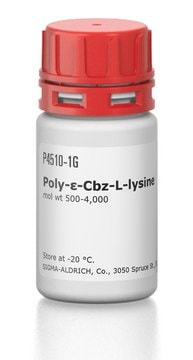P2254
Poly-L-proline
suitable for ligand binding assays, Mol wt 1,000-10,000
Synonyme(s) :
L-Proline homopolymer
About This Item
Produits recommandés
product name
Poly-L-proline, mol wt 1,000-10,000
Forme
powder
Niveau de qualité
Poids mol.
1,000-10,000
Technique(s)
ligand binding assay: suitable
Couleur
white
Température de stockage
−20°C
Chaîne SMILES
OC(=O)C1CCCN1
InChI
1S/C5H9NO2/c7-5(8)4-2-1-3-6-4/h4,6H,1-3H2,(H,7,8)
Clé InChI
ONIBWKKTOPOVIA-UHFFFAOYSA-N
Vous recherchez des produits similaires ? Visite Guide de comparaison des produits
Application
- Highly sensitive and selective electrochemical sensor for simultaneous determination of gallic acid, theophylline and caffeine using poly(l-proline) decorated carbon nanotubes in biological and food samples.: This study presents an innovative electrochemical sensor that utilizes poly-L-proline decorated carbon nanotubes for the simultaneous detection of gallic acid, theophylline, and caffeine. This sensor demonstrates high sensitivity and selectivity, making it suitable for applications in both biological and food samples (Aschemacher NA et al., 2024).
- Water-assisted and protein-initiated fast and controlled ring-opening polymerization of proline N-carboxyanhydride.: This research explores the water-assisted and protein-initiated ring-opening polymerization of proline N-carboxyanhydride, leading to the rapid and controlled synthesis of poly-L-proline. The study highlights the method′s efficiency and potential for producing high-quality poly-L-proline for various applications (Hu Y et al., 2022).
- Phosphorylation of the actin-binding protein profilin2a at S137 modulates bidirectional structural plasticity at dendritic spines.: This study examines the role of poly-L-proline regions in the actin-binding protein profilin2a, specifically focusing on its phosphorylation at S137. The findings reveal how these modifications impact the structural plasticity of dendritic spines, providing insights into neuronal function and plasticity (Cornelius J et al., 2023).
- A structural model of the profilin-formin pacemaker system for actin filament elongation.: This paper presents a structural model involving poly-L-proline regions within the profilin-formin complex, which acts as a pacemaker for actin filament elongation. The study offers a detailed understanding of the molecular mechanisms driving actin dynamics and cellular movement (Schutt CE et al., 2022).
Actions biochimiques/physiologiques
Remarque sur l'analyse
Autres remarques
Code de la classe de stockage
11 - Combustible Solids
Classe de danger pour l'eau (WGK)
WGK 3
Point d'éclair (°F)
Not applicable
Point d'éclair (°C)
Not applicable
Équipement de protection individuelle
Eyeshields, Gloves, type N95 (US)
Certificats d'analyse (COA)
Recherchez un Certificats d'analyse (COA) en saisissant le numéro de lot du produit. Les numéros de lot figurent sur l'étiquette du produit après les mots "Lot" ou "Batch".
Déjà en possession de ce produit ?
Retrouvez la documentation relative aux produits que vous avez récemment achetés dans la Bibliothèque de documents.
Les clients ont également consulté
Articles
Humankind has utilized protein materials throughout its existence, starting with the use of materials such as wool and silk for warmth and protection from the elements and continuing with the use of recombinant DNA techniques to synthesize proteins with unique and useful properties.
Notre équipe de scientifiques dispose d'une expérience dans tous les secteurs de la recherche, notamment en sciences de la vie, science des matériaux, synthèse chimique, chromatographie, analyse et dans de nombreux autres domaines..
Contacter notre Service technique











